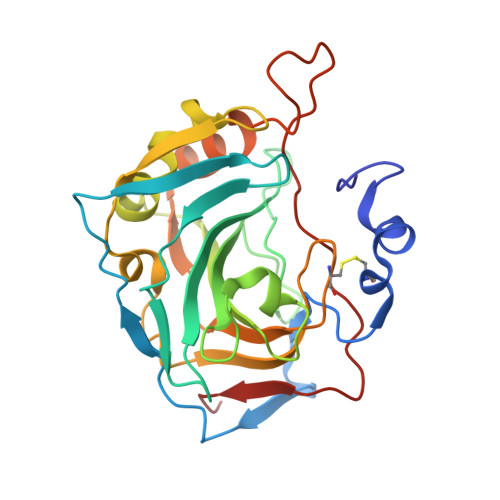Functionalization of Fluorinated Benzenesulfonamides and Their Inhibitory Properties toward Carbonic Anhydrases
Dudutiene, V., Zubriene, A., Smirnov, A., Timm, D.D., Smirnoviene, J., Kazokaite, J., Michailoviene, V., Zaksauskas, A., Manakova, E., Grazulis, S., Matulis, D.(2015) ChemMedChem 10: 662-687
- PubMed: 25758852
- DOI: https://doi.org/10.1002/cmdc.201402490
- Primary Citation of Related Structures:
4QIY, 4QIZ, 4QJ0, 4QJM, 4QJO, 4QJP, 4QJW, 4QJX, 4QTL - PubMed Abstract:
Substituted tri- and tetrafluorobenzenesulfonamides were designed, synthesized, and evaluated as high-affinity and isoform-selective carbonic anhydrase (CA) inhibitors. Their binding affinities for recombinant human CA I, II, VA, VI, VII, XII, and XIII catalytic domains were determined by fluorescent thermal shift assay, isothermal titration calorimetry, and a stopped-flow CO2 hydration assay. Variation of the substituents at the 2-, 3-, and 4-positions yielded compounds with a broad range of binding affinities and isoform selectivities. Several 2,4-substituted-3,5,6-trifluorobenzenesulfonamides were effective CA XIII inhibitors with high selectivity over off-target CA I and CA II. 3,4-Disubstituted-2,5,6-trifluorobenzenesulfonamides bound CAs with higher affinity than 2,4-disubstituted-3,5,6-trifluorobenzenesulfonamides. Many such fluorinated benzenesulfonamides were found to be nanomolar inhibitors of CA II, CA VII, tumor-associated CA IX and CA XII, and CA XIII. X-ray crystal structures of inhibitors bound in the active sites of several CA isoforms provide structure-activity relationship information for inhibitor binding affinities and selectivity.
- Department of Biothermodynamics and Drug Design, Institute of Biotechnology, Vilnius University, Graičiūno 8, Vilnius 02241 (Lithuania).
Organizational Affiliation:



















